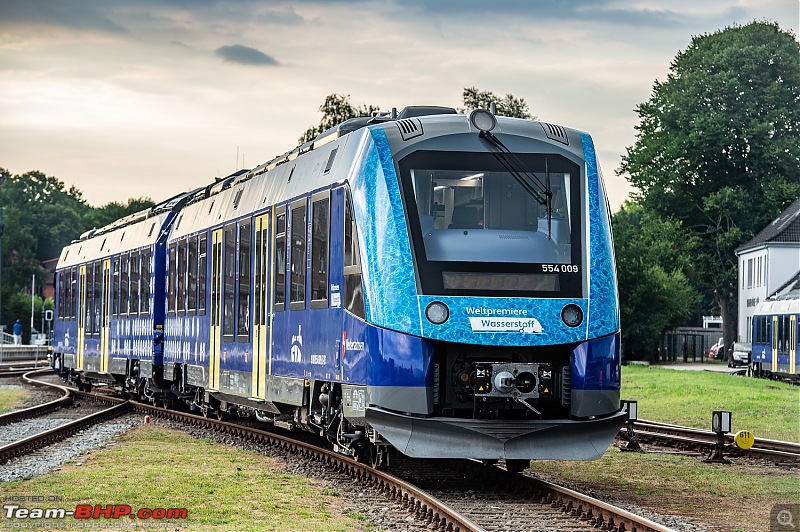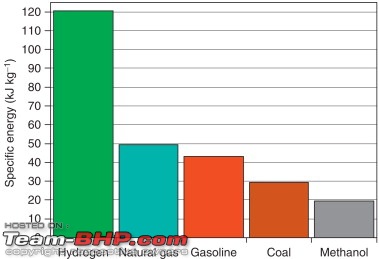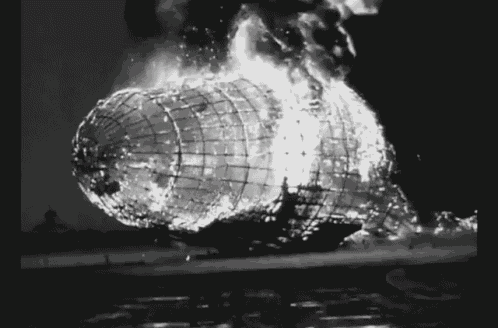Team-BHP
(
https://www.team-bhp.com/forum/)
Railways Minister Ashwini Vaishnaw has announced India’s first hydrogen-powered train. It will be put into service on the Kalka-Shimla historic circuit by December 2023.

According to the minister, the upcoming hydrogen-powered trains will be called 'Vande Metro'. The plan is to run these trains on historic narrow-gauge routes like the Darjeeling Himalayan Railway, the Nilgiri Mountain Railway, Matheran Hill Railway, Kangra Valley, Bilmora Waghai and the Marwar-Devgarh Madriya route.
The hydrogen-powered train will be designed and manufactured locally. It will use hydrogen fuel cells, which combine hydrogen and oxygen to generate electric. The byproduct of this reaction is pure water, making it highly eco-friendly.
However, the operating cost of hydrogen fuel cells is said to be 27% higher than that of a diesel engine. Storing hydrogen is also a challenge due to its highly combustible nature.
Source:
Hindustan Times Link to Team-BHP News
Matches with the initiatives from the Fin Min on budgetary allocation for green energy, especially for H2, for industrial use. Will be worth watching how this unfolds. Costs will come down, if the adoption takes ground.
Very keen to see how this pans out. Only one question, to me at least the way he worded it seemed like the Vande Metro is a separate initiative to these hydrogen powered trains. Aren't metro trains typically electric only?
I don't know much about narrow gauge trains, are these run by old school steam locomotives? Or just smaller versions of typical diesel locomotives? I guess the idea is these specialist fuel cell trains will be restricted to these historic routes.
We have it for the shipping and locomotives already. The technology is progressing fast for mass transit applications.
However, biggest problem is the cost!!
Whatever it be, steam traction has the right of way at NMR system. Four new X-class steam locos were deployed recently there. Darjeeling & NMR systems should be spared from this, especially considering they're UNESCO sites.
Exciting news indeed. Looking forward to see this train becoming operational.
Quote:
Originally Posted by TusharK
(Post 5489162)
Storing hydrogen is also a challenge due to its highly combustible nature.
|
I hope the authorities are going to be super over cautions regarding safety. In the past, when majority of the people were excited about new world class trains, some anti social elements had pelted stones and even trashed them from inside.
If these punks manage to do something to the hydrogen storage tanks, it will be a disaster.
For those who might not know, Hydrogen is super flammable. This happened in 1937.
https://en.wikipedia.org/wiki/Hindenburg_disaster
What is the source of HYDROGEN?
Request forum members in the know to reply.
Thank you.
I am perplexed why not electrify the network instead of deploying expensive hydrogen and expensive hydrogen fuel cells. Surely it will be cheaper in the long run and more efficient as well since there is no conversion from electricity to hydrogen to fuel cell to electricity again.
Quote:
Originally Posted by extreme_torque
(Post 5490088)
I am perplexed why not electrify the network instead of deploying expensive hydrogen and expensive hydrogen fuel cells.
|
I am sure that the cases of electrocution will be seen if railway tracks in the mountain regions are electrified. Due to difference in the height of roads and railway tracks (atleast on many sections of Kalka Shimla track), the high voltage electric wires will be in very close proximity to the road and trails (pagdandi) at a few places. These are my 2 cents. Falling trees, landslides can cause these wires to fall on the ground, thereby further increasing the risk of injury and death.
Quote:
Originally Posted by RedTerrano
(Post 5489294)
For those who might not know, Hydrogen is super flammable. This happened in 1937. ]
|
Hydrogen is very flammable but carries very little energie per cubic unit.
People have got a very warped idea about hydrogen and the Hindenburg disaster is often referred to as to illustrate how dangerous it is.
The truth is very different. It was not the hydrogen that ignited on the Hindenburg. The most likely cause was static electricity that build up on the outer skin of the zeppelin. This outer skin was basically fabric with several coatings of silver paint, that was extremely flammable. That started the fire and when it ruptured the hydrogen caught fire as well.
However, as you can clearly see the whole thing was over in literally seconds. If there had been any other gas in such a large quantity, the resulting explosion would have been far more catastrophic and the camera filming this event would have likely been destroyed as well as all the onlookers.
Yes, hydrogen has flammable properties, but it is very different from other gasses such as LPG and LNG and not necessarily any more dangerous. Just different and you need to accommodate for those differences.
Jeroen
Quote:
Originally Posted by Jeroen
(Post 5490189)
Hydrogen is very flammable but carries very little energie per cubic unit.
|
Hydrogen has the highest combustible energy per mole of any combustible gas.
See graph below.

It also has the lowest ignition energy among all the gases (approx 0.019mJ). Hence, its dangerous reputation.
When EV's lost their war with ICE, the standard sales pitch of the EV salesmen was to pin point how many times there was an explosion inside the cylinder. However, tech improved and Gasoline, due to its ease of use won that war against EV motors. Hydrogen fear will only last until it enters mass production.
There is a difference between the hindenburg explosion and today's H2 tanks, H2 is not a fuel in Hindenburg air ship and is not compressed, today's H2 tanks have H2 compressed at 10000psi, where H2 is used as a fuel.
I believe the cars and fuelling stations are built robust, but any explosion will be devastating for the surrounding 500meters.
Quote:
Originally Posted by srini1785
(Post 5490207)
Hydrogen has the highest combustible energy per mole of any combustible gas.
See graph below.
.....
|
Sorry for being pedantic here. The graph you have shown is Kilo-Joules per kg. Not Joules per mole.
Molecular mass of Hydrogen is 2 grams/mol
Molecular mass of Gasoline (assuming 100% octane) is 114 grams/mol (approx)
So, if one plots Joule per mole then Hydrogen's bar will be (much) smaller than gasoline (approx 1/20 times).
Quote:
Originally Posted by srvm
(Post 5490265)
Sorry for being pedantic here. The graph you have shown is Kilo-Joules per kg. Not Joules per mole.
Molecular mass of Hydrogen is 2 grams/mol
Molecular mass of Gasoline (assuming 100% octane) is 114 grams/mol (approx)
So, if one plots Joule per mole then Hydrogen's bar will be (much) smaller than gasoline (approx 1/20 times).
|
Yes. I believe you are right. Going by what is given in the graph
Hydrogen : 2gms/Mole => 500mole/Kg => 0.24KJ/Mole.
Gasoline : 114gms/Mole => 8.77 mole/Kg => 4.56KJ/Mole.
However, for a similar weight comparison, hydrogen is still more explosive since it has more atoms.
Quote:
Originally Posted by srini1785
(Post 5490282)
...
However, for a similar weight comparison, hydrogen is till more explosive since it has more atoms.
|
Yes, indeed.
And that's why one has to compress it to high pressure. Because-
Under standard conditions density of hydrogen is 0.09 kg/m3.
For comparison, under same conditions, density of air and gasoline are 1.29 and 730 kg/m3, respectively.
If not compressed, imagine the volume of hydrogen to be carried compared to gasoline!
Anyway, this is all off-topic and known to most people in the forum. Back to the main topic.
I for one, am scared of hydrogen powered buses and trains.
I'm an Aerospace engineer by degree and profession. And the Hindenberg disaster which was taught to us in classes (rightly or wrongly as Jeroen pointed out) has permanently scared me of Hydrogen powered vehicles.
| All times are GMT +5.5. The time now is 04:48. | |




